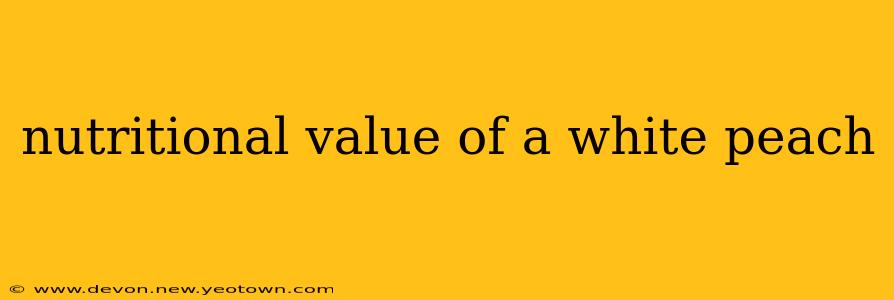The sun-kissed blush of a ripe peach, whether it's the classic yellow or the alluring white, signals summer's sweet arrival. But beyond its delightful flavor, the humble peach, especially the creamy white variety, packs a surprising nutritional punch. Let's delve into the juicy details of this often-underestimated fruit.
Imagine biting into a perfectly ripe white peach – its flesh melting in your mouth, releasing a burst of delicate sweetness. This isn't just a sensory delight; it's a nutritional powerhouse in disguise. While the nutritional profile might vary slightly depending on the size and growing conditions, white peaches generally offer a similar, if not superior, nutritional value compared to their yellow counterparts.
What Vitamins and Minerals are in White Peaches?
White peaches are a good source of several essential vitamins and minerals crucial for maintaining optimal health. They're particularly rich in:
- Vitamin C: A potent antioxidant that boosts the immune system and protects against cell damage. A single medium white peach can contribute a significant portion of your daily recommended intake.
- Vitamin A: Essential for vision health, skin integrity, and immune function. White peaches, while not as high in Vitamin A as some other fruits, still contribute to your overall intake.
- Potassium: An electrolyte vital for maintaining fluid balance, regulating blood pressure, and supporting muscle function.
- Fiber: Crucial for digestive health, promoting regularity and contributing to feelings of fullness. The fiber content in white peaches aids in maintaining a healthy gut microbiome.
Are White Peaches Healthier Than Yellow Peaches?
This is a question that often sparks debate among fruit enthusiasts. The truth is, both white and yellow peaches offer similar nutritional benefits. However, subtle differences exist. Some studies suggest that white peaches may have a higher antioxidant capacity due to their unique pigment composition. This means they may offer slightly enhanced protection against cell damage. Ultimately, both varieties are excellent additions to a healthy diet. The best choice simply depends on personal preference!
How Many Calories are in a White Peach?
A medium-sized white peach typically contains around 58 calories. This makes it a guilt-free treat that fits perfectly into a calorie-conscious diet. The relatively low calorie count, combined with its impressive nutrient profile, makes the white peach a smart snack choice.
What are the Health Benefits of Eating White Peaches?
Beyond their impressive vitamin and mineral content, white peaches offer several health benefits:
- Improved Digestive Health: The fiber content aids in regular bowel movements and supports a healthy gut.
- Boosted Immunity: The Vitamin C content strengthens the immune system, helping to fight off infections.
- Enhanced Vision: Vitamin A contributes to healthy vision and eye function.
- Improved Skin Health: Antioxidants help protect against cell damage, promoting healthy, radiant skin.
Are White Peaches Good for Weight Loss?
With their low calorie count and high fiber content, white peaches can be a valuable asset in a weight-management plan. The fiber helps you feel full and satisfied, reducing the likelihood of overeating. However, weight loss is a complex process that involves a balanced diet and regular exercise, and white peaches should be part of a holistic approach, not a miracle cure.
How to Incorporate White Peaches into Your Diet?
The versatility of white peaches knows no bounds! Enjoy them:
- Fresh: Simply wash and savor the sweet, juicy flesh.
- In Salads: Add slices to your favorite salads for a burst of flavor and texture.
- In Smoothies: Blend them into smoothies for a creamy, nutritious treat.
- In Desserts: Use them in pies, cobblers, or crisps for a delicious summer dessert.
The delicate sweetness and remarkable nutritional value of the white peach make it a true gem among fruits. So, next time you're at the market, don't hesitate to pick up a few—your taste buds and your body will thank you!

